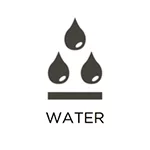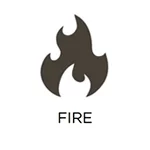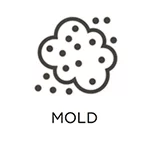RestorationMaster
Mold is an annoyance that can quickly spread damage and sickness throughout the property. With long-term exposure, it can cause structural damage and pose severe health issues. Mold is caused by excess moisture or untreated water damage, and it can be difficult to remove using home remedies. But with proper industrial cleaning products, equipment, and training, a professional can remove all mold growth and the source of the moisture, preventing it from returning in the future.
RestorationMaster is available 24/7 to provide mold removal services in Chatham, NJ. Our technicians are IICRC-certified and fully equipped to remove all types of mold and repair all damaged building materials.
Mold Growth Issues
It’s natural for mold spores to be present in the air, but these spores can grow into mold in a moisture-rich environment. The best way to prevent mold from growing in your home is to keep it well ventilated and the moisture levels low.
Mold growth on porous materials like drywall, insulation and wood can cause these materials to become weakened, stained, and rot over time. This will also threaten the structural integrity of the affected materials and increase the risk of collapse. As mold lives in a moist environment, it is usually the result of untreated water damage. This is why it’s important to have water damage restoration conducted right away.
Mold can also cause allergic reactions to everyone exposed, including headaches, itchy eyes and throat, skin irritation and nasal congestion. Without mold remediation, long-term exposure can cause respiratory infections.
Watch RestorationMaster video for more information on mold remediation:
Our Mold Removal Process
At RestorationMaster we have a thorough mold removal process that is designed to effectively eliminate mold in a safe and efficient manner. Our professionals can remove all types of mold from black, pink, white, blue or green. The removal process for all is the same. We follow strict guidelines from the IICRC and have an industry accepted approach. Here’s an overview of our process:
- Our first step in the mold removal process is to conduct a thorough inspection of the affected area. This allows us to assess the extent of the mold growth and identify any underlying moisture issues that may be contributing to the problem.
- Our professionals also use infrared technology to locate all affected areas, followed by safely removing the mold at the source. We are IICRC-certified and ready to work with you to safely restore your property to its original condition.
- Once we identify mold, we set up barriers and contain the area to prevent the spread.
- Next, we begin the process of physically removing the mold from the affected area. This may involve scrubbing surfaces, using HEPA vacuuming, or even removing and replacing contaminated materials if necessary.
- After the mold has been removed, we thoroughly clean and disinfect the are.
- At last, we work to restore any damage that may have been caused by the mold growth. This may involve repairing or replacing damaged materials, such as drywall or flooring.
Contact Us for Water Damage Related Mold Removal in Chatham, NJ
Don’t let mold continue to grow and cause damage to your property. Contact us today for professional mold removal services in Chatham, NJ. Our team is here to help you restore your property to a clean and healthy environment. We take pride in our work and strive to provide exceptional service to our customers.
For professional mold removal in Chatham, NJ , contact RestorationMaster at 973-685-6117. We provide free estimates and work with insurance agents.
Related Mold Remediation Services
Mold Cleaning in Parsippany, NJ
Mold Remediation Services in Mount Olive, NJ
Mold Remediation in Randolph, NJ
Mold Removal Company in Montville, NJ
Black Mold Removal in Morristown, NJ
Mold Removal Experts in Jefferson, NJ
More Information on Mold
How to remove mold odors from the refrigerator?
To eliminate mold odors from your refrigerator:
- Start by unplugging it and emptying its contents.
- Create a cleaning solution using equal parts water and either white vinegar or baking soda.
- Use a cloth soaked in this solution to thoroughly wipe down all interior surfaces, including shelves, drawers, and seals, paying special attention to any visible mold.
- After cleaning, rinse and dry everything thoroughly.
To prevent mold from coming back, keep the refrigerator clean and dry and address spills promptly. If the mold problem persists or is severe, it might be best to seek help from a professional mold cleanup specialist.
How to respond to black mold under the sink?
Black mold is dangerous and needs attention right away. It looks like dark, slimy or fuzzy patches and can make you sick if you breathe in its spores. If you find black mold under the sink, put on gloves, goggles, and a mask for protection. Clean the area with soapy water or a mix of water and vinegar. Make sure it’s completely dry afterward. If the mold is hard to remove, get help from a professional.
How to remove mold from roof and ceiling after it rains?
Rainy days and humidity can cause mold to grow on the roof and ceiling, especially if there are leaks. Mold loves damp spots and quickly spreads. Here’s what to do after a downpour: 1. Find where the mold is. 2. Fix any roof leaks. 3. Use a mold-killing spray. 4. Keep the area well-ventilated. 5. Check the roof and ceiling regularly for more mold. 6. Consider calling RestorationMaster for help with mold cleanup.
Mold Removal Frequently Asked Questions
What are some common signs of mold growth in my home?
You might notice mold in your home if you smell something musty, see patches of mold on walls or ceilings, or notice discoloration or staining. Sometimes, paint or wallpaper might peel, or you could have allergic reactions like sneezing or coughing. Keep an eye out for water stains or signs of water damage too. If you see any of these signs, it’s important to deal with the mold as soon as possible.
Can mold affect the value of my home?
Mold can affect the value of your home, as it can indicate underlying moisture or structural issues and may require costly remediation efforts.
What should I do if I have mold in my HVAC system?
If you have mold in your HVAC system, turn it off, and contact a professional HVAC technician or mold remediation specialist to clean it thoroughly.
What should I do if I suspect mold in my rental property?
If you suspect mold in your rental property, notify your landlord or property manager immediately and request a professional mold inspection. It’s important to act quickly to keep everyone safe and prevent more damage.




